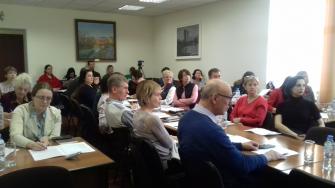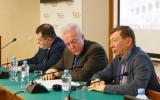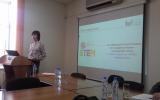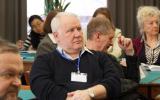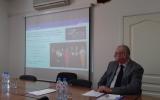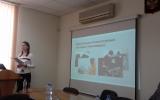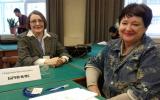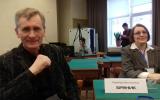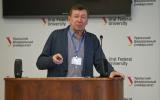Перед заполнением формы авторам необходимо ознакомиться с Правилами для авторов биографий для опубликования в энциклопедии «Ученые – профессиональному образованию».
Перед заполнением формы авторам необходимо ознакомиться с Правилами для авторов биографий для опубликования в энциклопедии «Педагог – исследователь».
12 и 13 февраля в Уральском федеральном университете состоялась международная междисциплинарная конференция «Инженерное мышление: социальные перспективы», которая была организована Уральским гуманитарным институтом УрФУ в сотрудничестве с Российским государственным профессионально-педагогическим университетом, а также с Уральским региональным научным центром РАО на базе УрФУ и Научным центром РАО на базе РГППУ.
Пленарное заседание конференции прошло 12 февраля в Уральском федеральном университете. К обсуждению были заявлены интеллектуальные тренды мирового сообщества, ориентированного на формирование социальных перспектив инженерного мышления. Это в том числе вопросы об этической составляющей инженерной деятельности, роли сообщества в формировании инженерного мышления, перспективах развития инженерного образования.
13 февраля, второй день конференции проходил в Российском государственном профессионально-педагогическом университете. Здесь состоялся круглый стол «Уральская инженерная школа: истоки, особенности и основные этапы развития. Подготовка инженерных кадров в условиях цифровизации». За круглым столом собрались философы и инженеры, педагоги высшей школы, колледжей, дополнительного образования. В работе круглого стола приняли участие 42 человека из России (Москва, Екатеринбург. Нижний Тагил, Верхняя Пышма, Челябинск, Качканар и др.) и Вьетнама, среди которых 7 докторов наук и 19 кандидатов наук.
Участников конференции приветствовал ректор РГППУ, доктор пед. наук, Евгений Михайлович Дорожкин. Он подчеркнул, что цифровая трансформация образования сегодня является задачей номер один для всего коллектива университета. В ее решении уже можно говорить и об определенных достижениях РГППУ. Это система электронного документооборота, дистанционное образование, открыта лаборатория психолого-педагогических исследований, полностью оснащенная современным цифровым оборудованием, лаборатория виртуальной и дополненной реальности, постоянно развивается информационная цифровая образовательная среда университета. РГППУ является федеральной экспериментальной площадкой по разработке цифровой дидактики профессионального образования. Но еще больше предстоит сделать. Важна совместная согласованная работа инженеров, философов, педагогов, ученых и практиков.
Ведущий круглого стола, доктор технич. наук, зав. каф.инжиниринга и профессионального обучения в машиностроении и металлургии РГППУ, Б.Н.Гузанов, раскрывая задачи предстоящего обсуждения, отметил, что становление нового технологического уклада, индустрии 4.0, характеризуется глубинным соприкосновением и взаимопроникновением гуманитарных и технических наук, появлением гибридных нано-био-информационных когнитивных наук и технологий, конвергентных технологий, цифровых интеллектуальных технологических экосистем, умного производства, развитием цифровой экономики и цифровой образовательной среды.
Драйвером инновационной трансформации выступает развитие цифровых информационных технологий. В этом контексте гуманизация и гуманитаризация инженерного мышления и образования выдвигаются в число приоритетных задач инновационного развития. В современных условиях нельзя не учитывать, что идущие процессы цифровизации, внедрения цифровых технологий ведут к изменению научного ландшафта. Появляются трансфер-интегративные, мультидисциплинарные области научных исследований и практической деятельности. Именно в этих областях формируются новые методологические подходы и ментальные модели. Анализируя такую трансфер-интегративную область как «цифровая гуманитаристика», доктор филос. наук, ученый секретарь НЦ РАО РГППУ, Л.М.Андрюхина выделила несколько перспективных ментальных моделей гуманитаризации инженерного мышления и образования. Доктор филос. наук Т.Ю.Быстрова (УрФУ) и ведущий инженер кафедры электортехники и электротехнических систем УрФУ В.Е.Силин раскрыли методологию визуализации ценностных гуманистических установок в проектном обучении инженеров и пригласили к участию в апробации новых технологий обучения.
Другая особенность инженерного мышления, как это было отмечено в выступлениях, определяется тем, что, техника конца ХХ и тем более XXI века – это уже не орудийно-прикладная, а фундаментальная техника, которая может влиять на самые основы бытия (на уровне когнитивных процессов, генном, молекулярном и нано-уровнях). Это актуализирует значение философского подхода, интеграции техники и философского знания, осмысление глубинных этических оснований инженерной деятельности. В своем выступлении канд. филос. наук, Д.В.Котелевский (УрФУ) обратился к фундаментальной философской концепции техники Жильбера Симондона, которая в свое время была в значительной мере недооценена, но сейчас находит вполне подходящее время и почву для как для реактуализации, так и для постановки новых вопросов о сущности техники и инженерного мышления. В выступлении канд. филос. наук Д.А.Томильцевой и доктора филос. наук Т. Г. Керимова (УрФУ) на тему «Цифровизация общества как социальная инженерия: этическая проблематизация», было показано, что идет изменение не только техники и технологий, но типов социальности, управления, моральных систем, типов поведения и представлений о том, что значит «быть человеком» В таких местах, как Google, Facebook, Microsoft и OpenAI инженеры разрабатывают радикально новые концепции того, что такое “ быть человеком”, жить своей жизнью и жить вместе, хотя чаще всего они уверены, что имеют дело только с техникой и технологиями. Магистрант УрФУ А. С Скутин подчеркнул важность обращения к философскому анализу фундаментальных оснований научно-конструктивного познания, без чего, по его мнению, посреди усиливающегося, но неподлежащего адекватной дифференциации потока информации, в отрыве от фундамента первоочевидностей мира жизни, результатом происходящей в наше время цифровизации может стать не экономия и ускорение, а ментально-телесное истощение человечества.
Канд. филос. наук А.А.Карташева (УрФУ) на примере анализа кейса о крушении шаттла «Челенджер» проанализировала модели рефлексии этических проблем и представила различные подходы к преподаванию инженерной этики.
Новые цифровые технологии по сути становятся платформой транспрофессиональной трансформации, размывая границы между профессиями, создавая надпрофессиональные и междисциплинарные информационные потоки, и формируя запрос на новые компетенции. О современных подходах к формированию транспрофессиональных компетенций студентов профессионально-педагогического вуза речь шла в выступлениях сотрудников кафедры инжиниринга и профессионального обучения в машиностроении и металлургии РГППУ кандидата пед. наук М.А.Федуловой, и доктора техн. наук Б.Н Гузанова. Кандидат пед. наук К.А. Федулова акцентировала внимание на значении информационно-инженерного мышления для осуществления цифровой трансформации общества и необходимости его развития у будущих педагогов профессионального обучения. Канд. пед наук Н.В.Ломовцева обратилась к современным аспектам электронного корпоративного обучения.
Большой интерес вызвали выступления, посвященные инновационным формам развития инженерного мышления в системе дополнительного образования детей. Е.П.Панасова, руководитель лаборатории «Космопорт»НПО «Автоматика», автор и руководитель программы ЮнГГ-Урал, подчеркнула, что цифровая экономика, одновременно с возможностями, которые она открывает, формирует и вызовы; меняются требования к уровню подготовки учащихся, поэтому необходимо менять и сам подход в работе предприятий с молодежью. При НПО автоматики с 2014 года работает лаборатория «Космопорт», где ведется обучение школьников. Лаборатория является неотъемлемой частью подготовки к проектным сменам, областным и всероссийским конкурсам. В «Космопорте» занятия робототехникой и занимательной математикой идут для детей от 9 лет, по мере освоения добавляются курсы 3D-моделирования и 3D-печати, программирование микроконтроллеров Ардуино, теория решения изобретательских задач и основы проектной деятельности. Воспитанники лаборатории регулярно завоёвывают призовые места на конкурсах вплоть до всероссийского уровня. С 2018 г. (т.е. с момента основания «Кванториума») НПО автоматики является партнёром Космоквантума регионального детского технопарка «Кванториум», ведётся совместная проектная деятельность, в партнёрстве проводятся хакатоны.
А.В.Молоднякова, директор ООО «АВСПАНТЕРА», познакомила с современными формами раннего инженерного образования на основе инновационной авторской технологии компьютерного 3D моделирования в LigroGame. О подготовке будущих технологических лидеров говорила Р.И. Рыбалко, руководитель фестиваля «Город Технотворчества», проектов «Проектная школа «Технолидер», «Уральская школа наставников». М.Н.Федотова, руководитель проекта "Инкубатор Профи", рассказала о роли олимпиад НТИ в развитии инженерного мышления школьников и их профилизации.
Магистрантка УрФУ из Вьетнама Ву Тхиен Тхюи Хиен представила результаты оригинального исследования особенностей искусственного интеллекта. Она охарактеризовала выявляемые сегодня ограничения систем автоматического мышления по сравнению с мышлением человека, которые возникают из-за невозможности моделирования структур бессознательного, присущих человеку, из-за чего неизбежно возникает деконтекстуализация и однозначность онтологий искусственного интеллекта. Например, ИИ-писатель может частично копировать поверхностную структуру знака, однако не может передать контекст и содержание, как это происходит в стихотворении, написанном человеком. Поэтому создание алгоритма или модели для точного моделирования когнитивных процессов в автоматизированной системе мышления представляет собой трудную задачу.
В развернувшейся дискуссии звучали как идеи о необходимости дальнейшего углубления интеграции инженерных наук и гуманитарного знания (О.И Уймина., А.А. Карташева, А.Г. Кислов и др.), так и подчеркивалось значение собственной логики развития техники и технического знания, специфики инженерной деятельности как фундамента подготовки современных инженеров(С.В. Анахов, В.М. Кондратьев и др.).
Участники дискуссии отметили конструктивность состоявшегося разговора и необходимость продолжать начатый диалог.
Round table at the international conference "Engineering Thinking: Social Perspectives"
12-13.02.2020. A round table devoted to the training of engineers in digitalization was held as part of the international interdisciplinary conference “Engineering Thinking: Social Perspectives”, which was organized by the Ural Humanitarian Institute of the Ural Federal University in cooperation with the Russian State Vocational Pedagogical University, as well as with the Ural Regional Scientific Center of the Russian Academy of Education on base of UrFU and RAO Scientific Center on the basis of RSPPU.
The plenary session of the conference was held on February 12 at the Ural Federal University. Intellectual trends of the world community focused on the development of social prospects for engineering thinking were announced for discussion. This includes questions about the ethical component of engineering, the role of the community in the devlopment of engineering thinking, and the prospects for the development of engineering education.
February 13, the second day of the conference was held at the Russian State Vocational Pedagogical University. A round table was held here “Ural Engineering School: the origins, features and main stages of development. Training engineering staff in digitalization. ” The round table brought together philosophers and engineers, teachers of higher education, colleges, and providers of further education. The round table was attended by 42 people from Russia (Moscow, Yekaterinburg. Nizhny Tagil, Verkhnyaya Pyshma, Chelyabinsk, Kachkanar and others) and Vietnam, including 7 Doctors of Sciences and 19 candidates of sciences.
Conference participants were welcomed by Professor Evgeny Mikhailovich Dorozhkin, Rector of the Russian State Vocational Pedagogical University. He emphasized that the digital transformation of education today is the task number one for the entire university staff. In its decision, it is already possible to speak about certain achievements of the RSVPU. This is an electronic document management system, distance education, a laboratory for psychological and pedagogical research, fully equipped with modern digital equipment, a laboratory for virtual and augmented reality is open, the university’s digital educational information environment is constantly developing. RSVPU is a federal experimental site for the development of digital didactics of vocational education. But more needs to be done. The important joint work of engineers, philosophers, educators, scientists and practitioners is important.
Leader of the round table, Professor B.N. Guzanov, Doctor of Engineering, Head of the Department of Engineering and Vocational Training in Mechanical Engineering and Metallurgy RSVPU, disclosing the tasks of the upcoming discussion, noted that the development of a new technological structure, industry 4.0, is characterized by deep contact and interpenetration of the humanities and technical sciences, the emergence of hybrid nano-bio-information cognitive sciences and technologies, convergent technologies, digital intelligent technological ecosystems, and smart manufacturing, the development of the digital economy and the digital educational environment.
The driver of innovative transformation is the development of digital information technology. In this context, the humanization and humanization of engineering thinking and education are put forward among the priority tasks of innovative development. In modern conditions, one cannot ignore that the ongoing processes of digitalization, the introduction of digital technologies lead to a change in the scientific landscape. Transfer-integrative, multidisciplinary areas of research and practice are emerging. It is in these areas that new methodological approaches and mental models are being formed. Analyzing such a transfer-integrative field as “digital humanities”, L.M. Andryukhina, PhD, Secretary of the Scientific Center of the Russian Academy of Public Administration of the RSVPU, has identified several promising mental models of the humanization of engineering thinking and education. T.Yu. Bystrova, PhD, UrFU, and V.E.Silin, Leading Engineer of the Department of Electrical Engineering and Electrotechnical Systems UrFU disclosed a methodology for visualizing valuable humanistic installations in the design training of engineers and invited to participate in the testing of new training technologies.
Another feature of engineering thinking, as was noted in the speeches, is determined by the fact that, the technology of the late twentieth and especially the twenty-first century is no longer applied, but a fundamental technique that can affect the very foundations of being (at the level of cognitive processes, gene, molecular and nano-levels). This actualizes the importance of the philosophical approach, the integration of technology and philosophical knowledge, the comprehension of the deep ethical foundations of engineering. In his speech, D.V. Kotelevsky, PhD, UrFU, turned to the fundamental philosophical concept of the technique of Gilbert Simondon, which at one time was largely underestimated, but now finds quite a suitable time and ground for both reactualization and raising new questions about the essence engineering and engineering thinking. In the speech of D.A. Tomiltsev, PhD, and T. T. Kerimova, PhD, UrFU, on the topic “Digitalization of society as social engineering: ethical problematization”, it was shown that there is a change not only in technology and industry, but also in the types of sociality, management, moral systems, types of behavior and ideas about what it means to be human In places like Google, Facebook, Microsoft and OpenAI, engineers are developing radically new concepts of what being human is, living their own lives and living together, although most often they are sure that they only deal with technique and technology. A. S Skutin, graduate student, UrFU emphasized the importance of turning to a philosophical analysis of the fundamental foundations of scientific and constructive knowledge, without which, in his opinion, amid the intensifying but inappropriate adequate differentiation of the flow of information, in isolation from the foundation of the primary evidence of the world of life, the result of digitalization happening in our time may not be saving and acceleration, but mental-bodily exhaustion of mankind.
A. A. Kartasheva, PhD, UrFU, using the example of the analysis of the shuttle crash case “Challenger” analyzed models of reflection of ethical problems and presented various approaches to teaching engineering ethics.
New digital technologies essentially become a platform for trans-professional transformation, blurring the boundaries between professions, creating super-professional and interdisciplinary information flows, and forming a request for new competencies. Modern approaches to the development of the trans-professional competencies of students of a vocational-pedagogical university were discussed in the speeches of the employees of the Department of Engineering and Vocational Training in Mechanical Engineering and Metallurgy of the RSVPU. K.A. Fedulova focused on the importance of information and engineering thinking for the digital transformation of society and the need for its development among future teachers of vocational training.
N.V. Lomovtseva turned to the modern aspects of electronic corporate training. She noted that this type of training allows organizations to quickly and effectively respond to a changing situation, providing employees with relevant knowledge on demand and without interruption from their core business. That is why e-learning allows modern companies to consider it as an investment that helps the company maintain a competitive advantage.
The speeches devoted to innovative forms of development of engineering thinking in the system of additional education of children aroused great interest. EP Panasova, head of the Cosmoport laboratory of NPO Avtomatika, author and program manager of YunGG-Ural, emphasized that the digital economy, along with the opportunities it opens up, also creates challenges; requirements for the level of training of students are changing, so it is necessary to change the approach in the work of enterprises with youth. Since 2014, the Cosmoport laboratory has been working at the NPO Automation, where schoolchildren are trained. The laboratory is an integral part of preparing for project shifts, regional and national competitions. At Cosmoport, classes in robotics and entertaining mathematics are for children from 9 years old. As you master, courses in 3D modeling and 3D printing, programming of Arduino microcontrollers, theory of solving inventive problems and the basics of project activities are added. Pupils of the laboratory regularly win prizes at competitions up to the all-Russian level. Since 2018 (that is, since the founding of the “Quantorium”), NPO Automation has been a partner of the Cosmocantum of the regional children's technopark “Quantorium”, joint project activities are being carried out, hackathons are being held in partnership.
Wu Thien Thuy, UrFU graduate from Vietnam presented the results of an original study of the features of artificial intelligence. She described the limitations of automatic thinking systems revealed today compared with human thinking, which arise due to the impossibility of modeling the structures of the unconscious inherent in man, which inevitably leads to decontextualization and unambiguity of ontologies of artificial intelligence. For example, an AI writer can partially copy the surface structure of a sign, but cannot convey context and content, as occurs in a poem written by a person. Therefore, creating an algorithm or model for accurate modeling of cognitive processes in an automated thinking system is a difficult task.
In the ensuing discussion, they sounded like ideas about the need for further deepening the integration of engineering sciences and humanitarian knowledge (O.I. Uimina., A.A. Kartashev, A.G. Kislova and others), and the importance of their own logic of the development of technology and technical knowledge was emphasized , specifics of engineering activity as the foundation for the training of modern engineers (S.V. Anakhov, V.M. Kondratiev, B.N. Guzanov, etc.).
Participants in the discussion noted the constructiveness of the conversation and the need to continue the ongoing dialogue.
